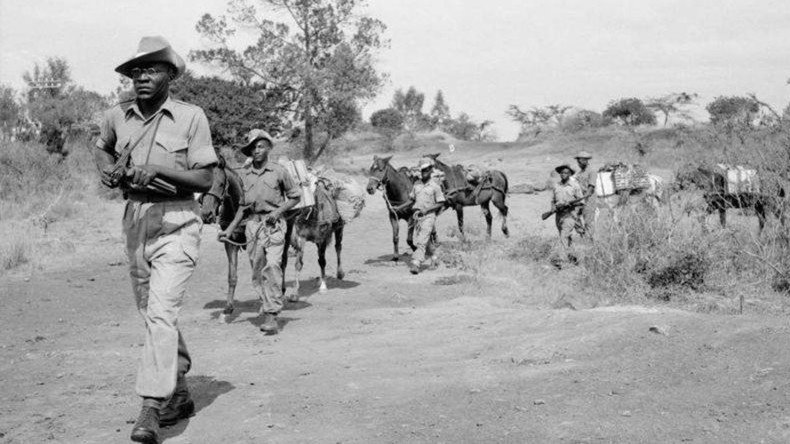Torture victims of Kenyan Mau Mau uprising take colonial abuse to High Court

The alleged victims of torture, rape and forced labor at the hands of British colonial officials during the Mau Mau rebellion in Kenya are having their claims for compensation heard in the High Court in London.
Manchester-based law firm Tandem Law is representing a class action of 40,000 claims which relate to abuse sustained during the so-called Kenya Emergency, when British colonial forces battled independence fighters.
Most of the alleged assaults took place in screening centres, prisons, detention camps and under compulsory resettlement programs known as ‘villagization’. In one claim, a mother alleges her daughter’s fingers were cut off in front of her.
Britain’s High Court will hear 27 test claims on Monday, including two from people who have died, in order to assess the range of allegations made by the entire group.
40,000 Kenyans accuse Britain of abuse and torture in second Mau Mau law suit http://t.co/0rWmNVmqxipic.twitter.com/8JeJAEdvRi
— RT UK (@RTUKnews) October 29, 2014
The government is expected to try to delay the case by disputing the translation of witness statements. Some 1,500 claimants have died since the class action was launched.
Justice Stewart will hear the claims, which relate to the Mau Mau Uprising between 1952 and 1961, when British colonial forces declared a state of emergency in Kenya.
Kenya was finally given independence in 1963, after a lengthy and bloody rebellion which saw 12,000 Kenyans killed.
Most claimants in this case are from the Kikuyu, Embu and Meru tribes.
Britain on trial: 1948 Malaya massacre case could crack open UK’s dark colonial past http://t.co/1MAQ8zy45Upic.twitter.com/Yx041vPtNV
— RT UK (@RTUKnews) April 22, 2015
Three years ago, law firm Leigh Day brought a test case before UK courts which established the British judiciary does have jurisdiction to hear historical claims by victims of colonial oppression in Kenya.
At the time then-Foreign Secretary William Hague announced Britain was paying out £19.9 million (about US$29 million) in costs and compensation to more than 5,228 elderly Kenyans who suffered torture and abuse during the Emergency.
Hague said he regretted the “abhorrent violations of human dignity” that took place in Kenya, but stopped short of admitting liability.
Supreme Court admits British troops committed ‘mass murder’ – Malaya massacre lawyer https://t.co/41ux4j7nQzpic.twitter.com/Je0bTURJWU
— RT UK (@RTUKnews) November 25, 2015
Among the victims of alleged British abuse was Hussein Onyango Obama, grandfather of current US president Barack Obama. According to his widow’s testimony, British soldiers forced pins into his fingernails and buttocks and squeezed his testicles between metal rods.
The British government kept records of colonial violence hidden for decades, refusing to release them to the National Archives.
Lead solicitor for the case Freddie Cosgove-Gibson said: “We are disappointed that the British government continue to dispute the claims on all fronts, especially when they settled similar claims three years ago.
“During this time at least 1,500 of our clients have sadly passed away, denying them the opportunity to see justice being done for the truly awful treatment they suffered during the 1952 Kenyan Emergency. Every day this number continues to increase.”












